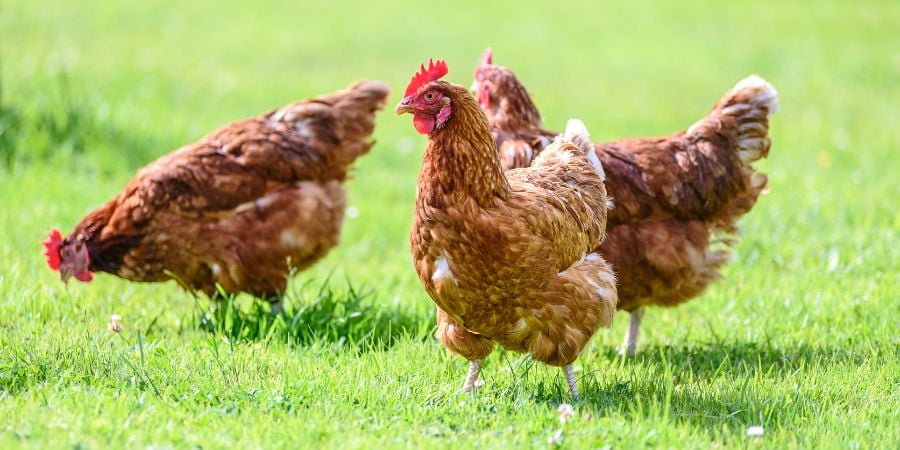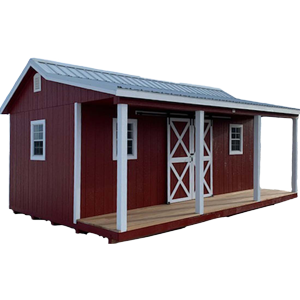From Coop to Table: The Delightful Journey of Fresh Eggs
by Dakota Storage Buildings, on October 23, 2023

Have you ever craved the unparalleled taste of fresh eggs straight from your own backyard? You are not alone. Raising chickens is becoming an increasingly popular activity for families, and for good reason. It is not a hobby to take lightly, but the rewards — fresh eggs, for example — are plentiful. We want to help guide you through what you need to know when getting started with chickens, key tips to keep in mind, and what the fascinating journey of raising backyard hens will look like. Besides delighting you with fresh eggs, chickens are also fantastic for gardeners as they target and remove unwanted pests. Whether it is the prospect of farm-fresh eggs every morning, the gardening benefits, or the sheer joy of a new family activity, there is something for everyone regarding raising backyard hens.
What to Know Before You Raise a Flock
Embarking on the adventure of raising chickens for fresh eggs is thrilling, but before you start picking out names for your future flock, there are some critical steps to consider. Choosing the right breed for your flock is important; you want the breed to fit seamlessly with your lifestyle, climate, and egg-laying expectations. For instance, if you are in a colder climate, you might consider breeds like the Plymouth Rock or Orpington, known for their hardiness in lower temperatures. The White Leghorn would be the best option if you are after prolific egg layers.
Some breeds, like the Silkie, are incredibly gentle and great for families with children, while others, like the Rhode Island Red, are more independent and self-sufficient. Researching breeds is one of the most exciting steps in your chicken-raising journey, but it's also one of the most important. Make sure to spend ample time understanding each breed's quirks, needs, and advantages.
Before you become too emotionally invested in waking up to the sounds of clucking, it is crucial to understand the legal landscape. Check your city or county's zoning laws concerning raising chickens. Regulations vary greatly, from complete prohibition to specific limitations like flock size or coop placement. Some areas might even require a permit or an annual fee. Being well-versed in local laws will save you headaches down the line.
Choosing your coop and run location is a matter of chicken well-being. Chickens need a clean, dry, and safe space to live. When choosing a location for your coop, consider factors like drainage (to keep it dry), sunlight (for warmth and health), and accessibility (for cleaning, feeding, and egg-collecting). The coop itself should be secure, well-ventilated, and comfortable. It should have nesting boxes for egg-laying and perches for sleeping.

Tips for a Happy Flock
The chicken-raising journey can be rewarding, but it is also full of challenges you may not have anticipated. Here are some in-depth tips to keep your experience smooth and your flock happy.
Do Your Research
It cannot be overstated how crucial it is to read up before diving into chicken-keeping. From the type of food that is best for your chosen breed to common health problems to watch out for, knowledge truly is power. Numerous books cover topics ranging from basic care and chicken psychology to diagnosing and treating illnesses. Blogs and online forums provide real-world tips and a sense of community. Local breeders and poultry farmers can offer advice that is specific to your region's climate and potential predators. Arm yourself with knowledge from diverse sources to ensure a well-rounded understanding of what it takes to raise chickens.
Protect Your Flock from Predators
Your chickens will quickly become part of your family; like any family member, their safety is paramount. The sad reality is that chickens sit pretty low on the food chain, and many predators find them tempting. Depending on where you live, you could be dealing with raccoons, foxes, hawks, or even larger predators like coyotes and bears. Protection starts with a well-designed coop. It should be sturdy, with locks on the doors and high-quality wire mesh instead of chicken wire, which is easy for predators to tear. An enclosed run should have a roof or netting to protect against airborne threats. Understand the predator landscape in your area and plan your defenses accordingly.
Eggs, Chicks, or Older Birds
Your journey could begin in several ways: incubating eggs, raising chicks, or acquiring adult chickens. Each has its pros and cons. Incubating eggs is a fascinating process that can be especially educational for kids, but it is also the most work-intensive. You will need an incubator and the patience to monitor temperature and humidity closely. Starting with chicks is somewhat easier but still requires specialized equipment like heat lamps. It also allows for bonding at an early age. Adult chickens require the least equipment and will likely start laying eggs much sooner, but they may also be more challenging to integrate into existing flocks if you plan to expand later.
The Ins and Outs of Egg Collection
After weeks of preparation, feeding, and caring for your flock, the moment you have been waiting for finally arrives: your hens start laying eggs. But what does this phase of chicken-raising entail? When you notice some physical changes, you will know your chickens are nearing egg-laying maturity. Adult feathers will replace the fluffier juvenile feathers. Most hens start laying eggs between 18 and 22 weeks old, although this can vary depending on the breed and individual chicken. When your hens start laying, the egg production might be erratic. You may find tiny "pullet eggs" initially, smaller than what you're used to seeing in stores. Over time, the size will normalize, and the laying schedule will become more consistent.
Ideally, you should collect eggs every morning. Hens usually lay in the early hours, and leaving eggs in the nest too long can result in breakage or encourage hens to start eating their own eggs — a habit you want to avoid. When collecting, bring along a sturdy basket or container. Wait until the hen leaves the nesting box (some hens are very committed sitters!) and gather the eggs. Always check them for cracks or abnormalities; a cracked shell can harbor bacteria and should be discarded.

Raising Your Flock
While having a flock of chickens and a steady supply of fresh eggs sounds ideal, it is not all clucking and pecking in the yard. Raising chickens comes with responsibilities and challenges that may not be immediately obvious. Here are some facts that could be game-changers for anyone considering raising their own flock.
Chickens Have Personalities: Chickens are not just egg-laying machines; they have individual personalities and social hierarchies — often called the "pecking order." Some are shy and submissive, while others can be assertive or even aggressive. Learning about your chickens' personalities can help you manage them better and even prevent conflicts within the flock.
Not All Hens Are Equal Layers: While you might get into chicken keeping for the fresh eggs, not all hens are prolific layers. Some breeds, like the White Leghorn, are excellent layers, producing an egg almost every day. Others, like the Orpington, lay fewer eggs but are better suited for meat production or even just as pets. Choose your breeds carefully, depending on your egg expectations.
Space is Non-negotiable: Though chickens are relatively small creatures, they need adequate space to live happily and healthily. Overcrowding can lead to stress and disease among the flock. Generally, each chicken should have at least 2-3 square feet of space within the coop and 8-10 square feet in an outdoor run.
Chickens Eat Almost Anything: Though chickens are omnivorous and enjoy a variety of foods, they should not eat everything. Foods like chocolate, avocado, and certain plant leaves are toxic to chickens. Ensure you know what is chicken-safe before you start sharing kitchen scraps.
Laying Declines With Age: A hen's egg production will generally start to decline after her second year. While some hens lay eggs for many years, the number and quality of eggs may reduce as they age. This is something to consider if you are getting into chicken keeping primarily for the eggs.
The Comprehensive Guide to Backyard Chickens
The appeal of raising chickens is undeniable. Visions of free-range hens happily clucking away, children collecting fresh eggs in the morning, and the satisfaction of knowing where your food comes from all add to the allure. But, as with any undertaking, there's more to chicken-keeping than meets the eye. Owning chickens is more than an eco-friendly hobby or a quest for the freshest breakfast. It's a commitment, a learning experience, and a continuous journey of understanding and adapting. While it might be tempting to jump in headfirst, patience is crucial. Take your time and absorb all the information you can. For a comprehensive guide with detailed information and best practices, we encourage you to download our free resource, The Beginner’s Guide to Raising Backyard Chickens, today!

























